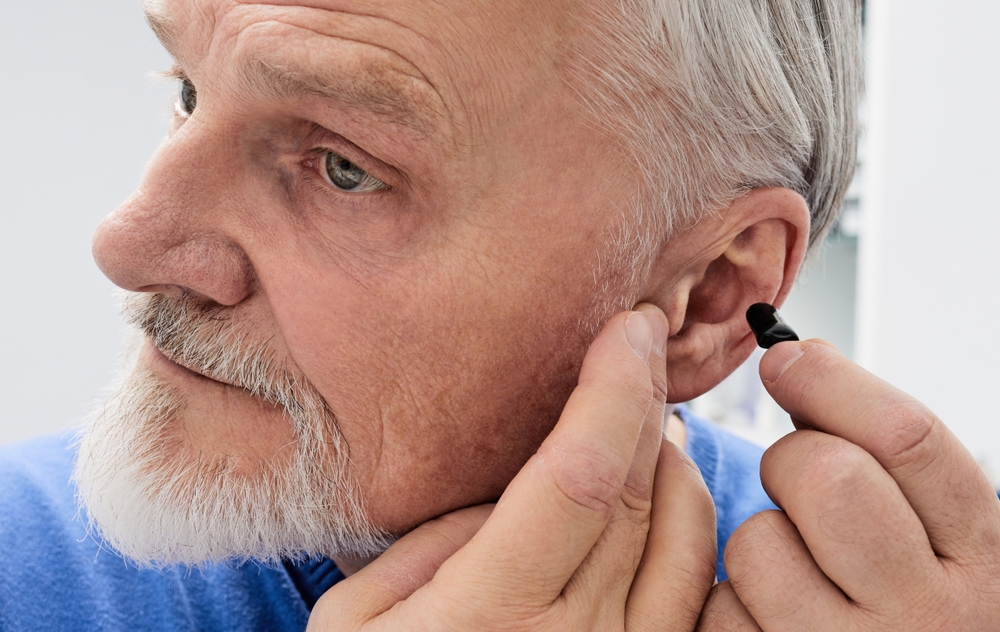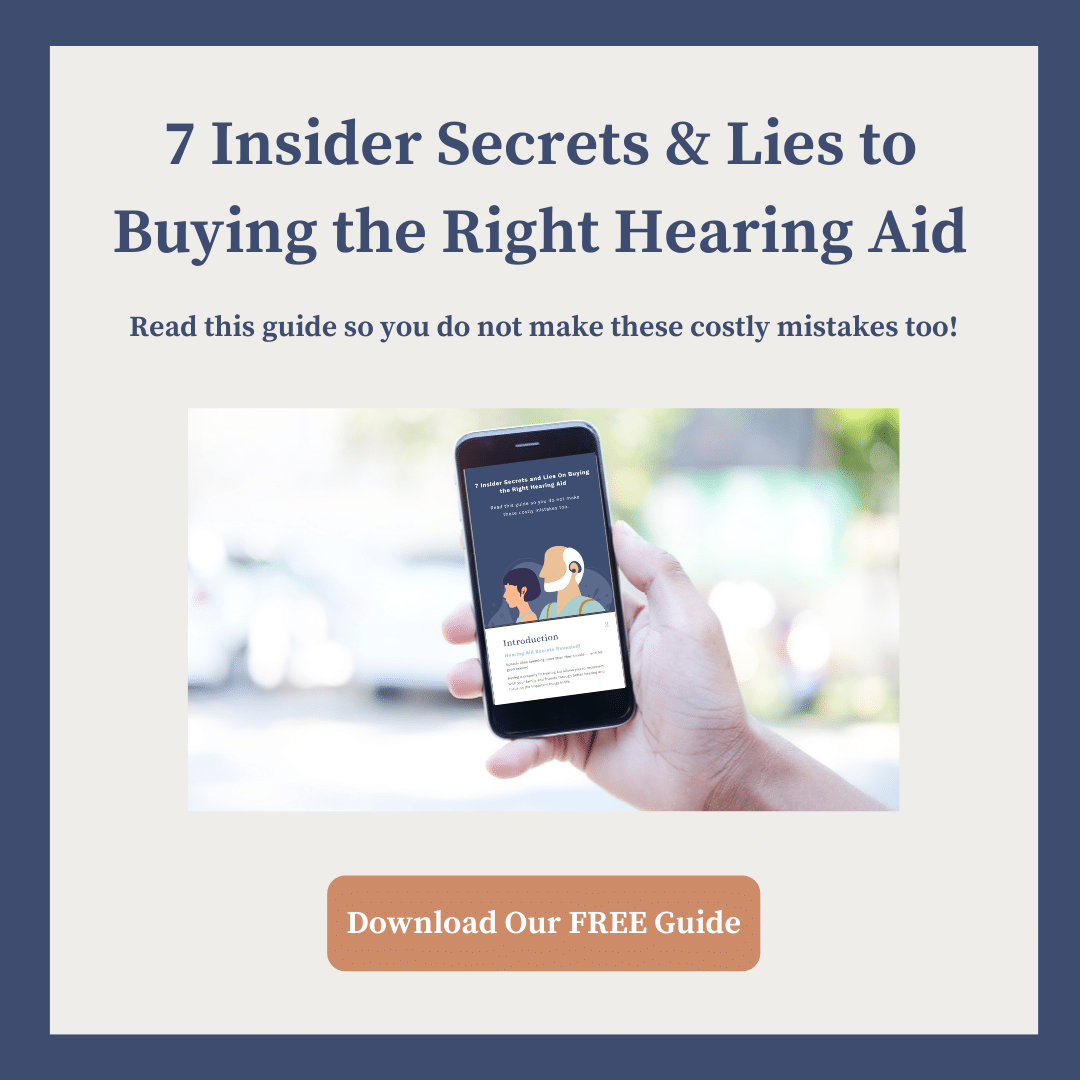Have you experienced these problems?
- I can hear. I can’t understand in background noise.
- So many people mumble!
- People just do not bother to speak clearly anymore!
- My wife speaks to me from the other side of the house and then wonders why I cannot understand!
- When I was a child, we had to speak clearly and we were taught to pronounce every word. These days everyone mumbles.
- I hardly go to cocktail parties or gatherings in restaurants because I can’t tell what people are saying.
- I had a hearing test and the doctor told me everything is fine for my age.
Traditional Hearing Tests
Standard/traditional hearing tests often involve something along the lines of “press the button when you hear the beep.” Although those standard methods are good at finding problems which need medical attention, far fewer than ten percent of all hearing problems need or require medical attention. There are almost 40 million Americans with hearing loss (usually mild-to-moderate, usually both ears, often with tinnitus/ringing in the ears), There are an additional 26 million Americans with no hearing loss at all, yet they complain about hearing difficulty and most often cannot understand in background noise.
Wait. What? This does not seem to make sense.
Hearing versus Listening
The confusion is that most people (and most professionals) believe that hearing and listening are synonyms, or that they are more-or-less the same. They are not. Hearing is simply detecting sound. Listening is the ability to make sense of sound.
Here is an example;
Suppose you were at a café in Berlin and everyone was speaking German. You could probably hear them just fine, but unless you happen to speak German, you would not understand what they were saying.
That is the difference between hearing and listening.
After 40 years as an audiologist, I can assure you most people don’t want sound louder, they want it clearer, and clarity is most often founded in the Signal-to-Noise Ratio, which we will address below.
In humans, hearing is very important. However, hearing is only step one in the complete listening process. Listening is the true goal. Listening requires hearing, but listening goes further and deeper. Listening requires cognition, vocabulary, memory, meaning, attention, intention, auditory and other information processing, emotional and psychological well-being and interaction, an appropriate signal-to-noise ratio and more. Listening can be thought of as a “whole brain” event. Listening starts with hearing, but listening is much more than hearing.
Listening problems without hearing problems are common. These problems might be called functional hearing problems, auditory processing problems, sub-clinical hearing loss or suprathreshold listening disorders (and more!).
Signal to Noise Ratio
The Signal-to-Noise Ratio (SNR) is the primary determinant of how well someone can understand speech-in-noise (SIN). The SNR is measured in loudness units called decibels (dB) and is a super simple concept. The SNR is a measure of how much louder the primary speech signal needs to be (in dB) for a person to be able to listen clearly in a noisy background.
For example, most people without hearing loss can listen well when the SNR is 1, 2 or 3 dB. That is, when the primary speech signal is louder than the noise by 1, 2 or 3 dB, they can make sense of the primary speech signal. However, for people with mild-to-moderate hearing loss, they might need about 7, 8 or 9 dB of SNR to listen well. In some respects, the ability to listen to SIN is more dependent on the SNR than on the overall loudness.
Individuals can visit their local hearing care professional to obtain a SIN test, which determines their personal SNR requirement which impacts which amplification system (i.e., hearing aids, assistive listening devices, loop systems, FM systems, digital remote microphones and more) would suit you best regarding your ability to understand SIN. Unfortunately, SNR is generally overlooked and is most often NOT a part of a typical hearing test.
Managing the SNR
The good news is that there are many potential solutions to the SIN problem.
One solution is to understand the SNR problem and apply environmental “fixes” to make it easier to listen. For example, one might reduce the distance between the person speaking and the person listening.
Another environmental solution is to improve the lighting. That may sound weird, but most people “speech read” all the time (we used to call this lip reading). Speech reading helps a lot! The thing to know about speech reading is that it allows the listening person to increase the total communication signal through additional visual cues (also called ‘redundant’ cues) which can reduce the listening effort substantially while increasing listening success. It is interesting to note that audition and vision are integrated in a part of the brain called the thalamus. In a very real way, the speech signal compliments the visual signal and vice versa. The more information the brain has, the easier it is for the brain to make sense of the entire scene, and this makes it easier to listen and understand.
Beyond environmental fixes, there are technology-based fixes.
The most popular and practical solution is to wear professionally selected and professionally programmed hearing aids. Of course, as we all know, hearing aids can make it easier to ‘hear’ (make things louder) but perhaps more importantly, professionally fitted prescription hearing aids can improve the SNR from a little, to a lot. One can easily observe the improvement in SNR by obtaining an “unaided” SNR and then an “aided” SNR. The difference between unaided and aided is the improvement attributed to the technology selected.
In addition to prescription hearing aids, there are many hearing aid options which are extremely useful. For example;
Loop Systems and Tele-Coils improve the SNR and are often used to better understand phone calls, but also extremely useful in train stations, houses of worships and well-designed lecture halls and more.
Bluetooth connectivity for podcasts, phone calls, streaming music and just about anything you might choose to listen to.
FM systems and Digital Remote Microphone systems can be thought of as little wireless, radio stations. These systems typically require that the person speaking must use a specific wireless microphone, which transmits the radio signal directly to the prescription hearing aids, which increases the SNR dramatically.
Custom earmolds. Most people use ear canal inserts called “domes.’ Domes are not particularly good at reducing background noise and as a matter of fact, domes allow noise to pass right through the dome and into the ear. Custom earmolds (with tiny vents) are much better as they are custom-made to fit your ear canal, and they help reduce noise and they allow the hearing aid to process more of the sounds around you!
Over The Counter (OTC) hearing aids. OTC hearing aids may work for some people. The problems are that high quality OTC hearing aids often cost just as much as entry-level and mid-level prescription hearing aids, but there is no one available to guide you, or measure your hearing, or your speech in noise ability, or your unaided versus aided speech in noise scores. When people wear OTC, they very likely will hear louder, but the goal is to hear more clearly, to listen better, and we just do not know how the OTC products will perform with regard to SNR and SIN.
Assistive Listening Devices (ALDs) come in a vast array of technologies and costs and effectiveness. Basic ALDs include headsets with amplifiers and microphones. These can be very effective and are usually inexpensive. The “go to” ALD for many hearing care professionals is the Williams Sound Pocket-Talker. It is a good idea to Google this to see how it looks and works. It has been on the market for decades and is a fine solution for many people.
Bottom Line:
The bottom line is that for tens of millions of Americans, the ability to understand speech in noise may be a hearing problem, it may be a listening problem, and it may be both, or neither.
The best approach is to contact a licensed hearing care professional (HCP) to schedule a comprehensive audiometric evaluation (a complete assessment, not a hearing test, not a hearing screening.)
After 40 years as an audiologist, I personally need to know all the test results (hearing and listening) sought in the Best Practice recommendations of the American Academy of Audiology (AAA), The American Speech Language Hearing Association (ASHA) and/or the International Hearing Society (IHS)..
There are no acceptable short-cuts.
There is no “one size fits all” in hearing healthcare. To get the best answer for each individual, HCPs work in accordance with Best Practices by AAA, ASHA and/or IHS (all of which includes SIN assessments and listening and communication assessments). HCPs who practice in accordance with Best Practices Guidelines from the AAA, ASHA or IHS already assess SIN, and those results are included in their assessments and recommendations.
– Written by Douglas L. Beck, Au.D., Doctor of Audiology, Excellence in Audiology Contributor.












